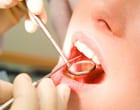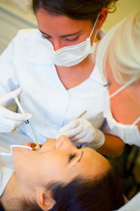 It’s never wise to ignore gum disease, not only for the short term affects it can have on the health of your teeth, but for the long term affects that it can have on many of the vital organs in your body. Most of us in the city of Leeds are likely to suffer from some form of the condition at sometime in our lives. But when it happens, it needs to be checked immediately. It arises out of poor dental hygiene, but if allowed to flourish, it can promote decay in the teeth and inevitably tooth loss. If it’s caught quickly, it can be stopped easily; regular brushing each day, with the right added extras such as flossing, mouthwashes and a few herbal remedies can not only stop it from developing further, but and also regenerate stimulation in the gums again. Extreme gum disease however, will need the help of your dentist to deep scale your gums and teeth, remove any bacteria from the roots of the teeth and possibly a course of antibiotics. But there are more serious implications behind gum disease- it poisons the bloodstream and over a period of time, this will start to affect your heart liver and kidneys. It can also promote the development of diabetes in the body. Ironically, diabetes and gum disease are partners in crime, for diabetics are prone to gum disease, a vicious circle you really need to avoid.
It’s never wise to ignore gum disease, not only for the short term affects it can have on the health of your teeth, but for the long term affects that it can have on many of the vital organs in your body. Most of us in the city of Leeds are likely to suffer from some form of the condition at sometime in our lives. But when it happens, it needs to be checked immediately. It arises out of poor dental hygiene, but if allowed to flourish, it can promote decay in the teeth and inevitably tooth loss. If it’s caught quickly, it can be stopped easily; regular brushing each day, with the right added extras such as flossing, mouthwashes and a few herbal remedies can not only stop it from developing further, but and also regenerate stimulation in the gums again. Extreme gum disease however, will need the help of your dentist to deep scale your gums and teeth, remove any bacteria from the roots of the teeth and possibly a course of antibiotics. But there are more serious implications behind gum disease- it poisons the bloodstream and over a period of time, this will start to affect your heart liver and kidneys. It can also promote the development of diabetes in the body. Ironically, diabetes and gum disease are partners in crime, for diabetics are prone to gum disease, a vicious circle you really need to avoid.





 Taking care of your teeth properly needs to form an integral part of your every day routine in the same way that you have a shower, eat your meals and go to bed at night. If you don’t take care of your teeth properly then you could lose them and they are the only natural set that you have. Don’t put yourself at the mercy of dental decay and gum disease, follow the simple suggestions set out below and you should have nothing to worry about when it comes to the good health of your mouth.
Taking care of your teeth properly needs to form an integral part of your every day routine in the same way that you have a shower, eat your meals and go to bed at night. If you don’t take care of your teeth properly then you could lose them and they are the only natural set that you have. Don’t put yourself at the mercy of dental decay and gum disease, follow the simple suggestions set out below and you should have nothing to worry about when it comes to the good health of your mouth. Often overlooked in favour of teeth, maintaining healthy gums is just as important to having a healthy mouth. Experts believe that as much as three quarters of the adult population of Britain over the age of thirty five are currently suffering from some stage of gum disease, which is a greater cause of tooth loss than tooth decay itself. Contact your City of Leeds dentist today as gum disease in its early stages is often entirely reversible.
Often overlooked in favour of teeth, maintaining healthy gums is just as important to having a healthy mouth. Experts believe that as much as three quarters of the adult population of Britain over the age of thirty five are currently suffering from some stage of gum disease, which is a greater cause of tooth loss than tooth decay itself. Contact your City of Leeds dentist today as gum disease in its early stages is often entirely reversible. Maintaining healthy gums is just as vital for oral hygiene as looking after your teeth. With experts suggesting that as many as seventy five per cent of Britons over thirty five years of age have some form of gum disease it has never been more important to take your gum’s health seriously. Bleeding gums are a sign that gum disease is taking hold and you should contact your Central Leeds dentist immediately if you notice it occurring.
Maintaining healthy gums is just as vital for oral hygiene as looking after your teeth. With experts suggesting that as many as seventy five per cent of Britons over thirty five years of age have some form of gum disease it has never been more important to take your gum’s health seriously. Bleeding gums are a sign that gum disease is taking hold and you should contact your Central Leeds dentist immediately if you notice it occurring. It’s very easy to overlook dental hygiene and rely on the dentist to solve any complications when they arise and restore the health of the teeth again, according to a central Leeds dentist. But what happens in the mouth, can affect the rest of the body and any oral infections and disease can lead to very serious health issues. Bacteria are a constant danger to our teeth and if unchecked, can lead to dental caries (or cavities) and then pain, disease, tooth loss and infection- in some cases, death. Caries attack the tooth in three different ways. The first is on the top of the tooth where the enamel folds into crevasses and is the most difficult area to clean. If plaque is allowed to build up, the bacteria will slowly form cavities and these can be spotted visually. The second location is where the tooth reaches down to the gum (a white, chalky spot being a give away) and the third is the root- these can be detected by a radiograph and are more difficult to treat. The worst example is where cavities occur in a lot of teeth- rampant caries and children are at high risk to this, especially when new teeth are coming through. Common causes of caries are high sugar content foods and a bacteria promoting diet that leads to plaque and tartar, a dry mouth due to the lack of saliva (often due to the use of stimulants and/or smoking) and poor oral hygiene. If decay is detected, immediate treatment will be required. Depending on the extent of the problem, a filling is the most common solution. If the level of decay is bad, the tooth may require a root canal and in extreme cases, an extraction may be the only answer.
It’s very easy to overlook dental hygiene and rely on the dentist to solve any complications when they arise and restore the health of the teeth again, according to a central Leeds dentist. But what happens in the mouth, can affect the rest of the body and any oral infections and disease can lead to very serious health issues. Bacteria are a constant danger to our teeth and if unchecked, can lead to dental caries (or cavities) and then pain, disease, tooth loss and infection- in some cases, death. Caries attack the tooth in three different ways. The first is on the top of the tooth where the enamel folds into crevasses and is the most difficult area to clean. If plaque is allowed to build up, the bacteria will slowly form cavities and these can be spotted visually. The second location is where the tooth reaches down to the gum (a white, chalky spot being a give away) and the third is the root- these can be detected by a radiograph and are more difficult to treat. The worst example is where cavities occur in a lot of teeth- rampant caries and children are at high risk to this, especially when new teeth are coming through. Common causes of caries are high sugar content foods and a bacteria promoting diet that leads to plaque and tartar, a dry mouth due to the lack of saliva (often due to the use of stimulants and/or smoking) and poor oral hygiene. If decay is detected, immediate treatment will be required. Depending on the extent of the problem, a filling is the most common solution. If the level of decay is bad, the tooth may require a root canal and in extreme cases, an extraction may be the only answer. A dentist from the City of Leeds was very concerned about the dropping standards of oral hygiene even though there are so many dental cleaning products available in the market today. People are still not very educated about how to protect their teeth and in turn, their health. The doctor even talked about the importance o getting regular checkups done so that any problems could be nipped in the bud. A thorough cleaning could also be set up during the time of the dental check up.
A dentist from the City of Leeds was very concerned about the dropping standards of oral hygiene even though there are so many dental cleaning products available in the market today. People are still not very educated about how to protect their teeth and in turn, their health. The doctor even talked about the importance o getting regular checkups done so that any problems could be nipped in the bud. A thorough cleaning could also be set up during the time of the dental check up. Taking good care of your teeth is very important. If you look after your teeth well, they will last you a lifetime but the consequences of ignoring dental hygiene can result in pain, expensive treatment and embarrassing dental conditions. From an early age we are all taught how to clean our teeth and the very good reasons for doing so, but often as people get older they become complacent or forget to look after their teeth as well as they can. Leeds dentists are urging all patients to care more for their teeth and can offer tips at check up appointments, as well as looking for any signs of decay.
Taking good care of your teeth is very important. If you look after your teeth well, they will last you a lifetime but the consequences of ignoring dental hygiene can result in pain, expensive treatment and embarrassing dental conditions. From an early age we are all taught how to clean our teeth and the very good reasons for doing so, but often as people get older they become complacent or forget to look after their teeth as well as they can. Leeds dentists are urging all patients to care more for their teeth and can offer tips at check up appointments, as well as looking for any signs of decay. Bad breath is a very unpleasant condition for both the sufferer and those around them. Worst of all, there is often no way of telling if you are suffering from unless someone tells you and this can be very embarrassing.
Bad breath is a very unpleasant condition for both the sufferer and those around them. Worst of all, there is often no way of telling if you are suffering from unless someone tells you and this can be very embarrassing. The easiest way to make sure you have healthy teeth is to have healthy gums. After all, teeth are secured by gum tissue so having unhealthy gums affected by disease will have a negative impact on the teeth as well. Gum disease is very common in the UK with three out of four adults suffering from at least the milder form of the disease at some stage in their life. Gum disease is easily treated in its early stages with improved dental hygiene and some treatment from a dentist. This will not only improve the appearance of your gums but will also help to keep the teeth strong, healthy and free from decay.
The easiest way to make sure you have healthy teeth is to have healthy gums. After all, teeth are secured by gum tissue so having unhealthy gums affected by disease will have a negative impact on the teeth as well. Gum disease is very common in the UK with three out of four adults suffering from at least the milder form of the disease at some stage in their life. Gum disease is easily treated in its early stages with improved dental hygiene and some treatment from a dentist. This will not only improve the appearance of your gums but will also help to keep the teeth strong, healthy and free from decay.

